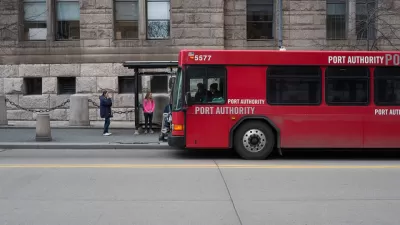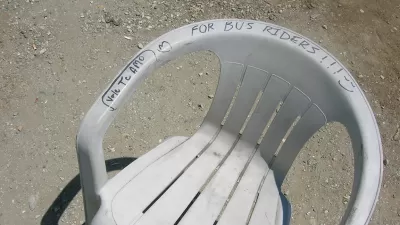Sounds counterintuitive doesn't it? But a new study by researchers at George Mason University suggests that eliminating bus stops can drastically improve service without substantially reducing the number of riders served.
It's a hypothetical study involving a rather unique community, but the findings reported by public policy professor Edmund Zolnik and a group of researchers at George Mason University could have broad significance. "In a paper published earlier this year, they concluded [a bus system in Fairfax, Va. that serves the university community] could reduce travel times by 23 percent and cut operating costs by about same amount if it scrapped 43 percent of its bus stops," reports Ryan Holeywell.
"That may seem dramatic, but they say it wouldn't drastically reduce the number of community members served by the system," adds Holeywell. But that conclusion is based on the assumption that passengers would be willing to walk half a mile to a stop.
The study found that reducing the City-University-Energysaver (CUE) bus system's stops from 121 to 68 resulted in shortening a one-way trip on the route from 2 hours and 4 minutes to 1 hour and 36 minutes.
"Not only would that make the trip shorter for existing riders, Zolnik says, but such a reduction in travel times would likely encourage more people to use the system since it could be more useful for them. Moreover, the transit system could use the savings to fund things that might encourage transit use, like cheaper fares or upgraded bus shelters."
FULL STORY: Why Getting Rid of Bus Stops Can Improve Bus Service

Maui's Vacation Rental Debate Turns Ugly
Verbal attacks, misinformation campaigns and fistfights plague a high-stakes debate to convert thousands of vacation rentals into long-term housing.

Planetizen Federal Action Tracker
A weekly monitor of how Trump’s orders and actions are impacting planners and planning in America.

In Urban Planning, AI Prompting Could be the New Design Thinking
Creativity has long been key to great urban design. What if we see AI as our new creative partner?

Massachusetts Budget Helps Close MBTA Budget Gap
The budget signed by Gov. Maura Healey includes $470 million in MBTA funding for the next fiscal year.

Milwaukee Launches Vision Zero Plan
Seven years after the city signed its Complete Streets Policy, the city is doubling down on its efforts to eliminate traffic deaths.

Portland Raises Parking Fees to Pay for Street Maintenance
The city is struggling to bridge a massive budget gap at the Bureau of Transportation, which largely depleted its reserves during the Civd-19 pandemic.
Urban Design for Planners 1: Software Tools
This six-course series explores essential urban design concepts using open source software and equips planners with the tools they need to participate fully in the urban design process.
Planning for Universal Design
Learn the tools for implementing Universal Design in planning regulations.
Gallatin County Department of Planning & Community Development
Heyer Gruel & Associates PA
JM Goldson LLC
City of Camden Redevelopment Agency
City of Astoria
Transportation Research & Education Center (TREC) at Portland State University
Jefferson Parish Government
Camden Redevelopment Agency
City of Claremont





























